Key takeaways:
- Humane treatment in the criminal justice system emphasizes dignity, respect, and rehabilitation over punishment, highlighting the need for emotional support and self-reflection.
- The anti-death penalty movement addresses moral implications and systemic flaws in justice, advocating for alternatives that focus on addressing societal issues like racism and socioeconomic disparities.
- Building a support network and engaging local legislators can amplify advocacy efforts for humane treatment and death penalty abolition, emphasizing the impact of personal stories on legislation.
- Community awareness events foster empathy and understanding through personal narratives, prompting dialogue and a deeper connection to the realities of capital punishment.
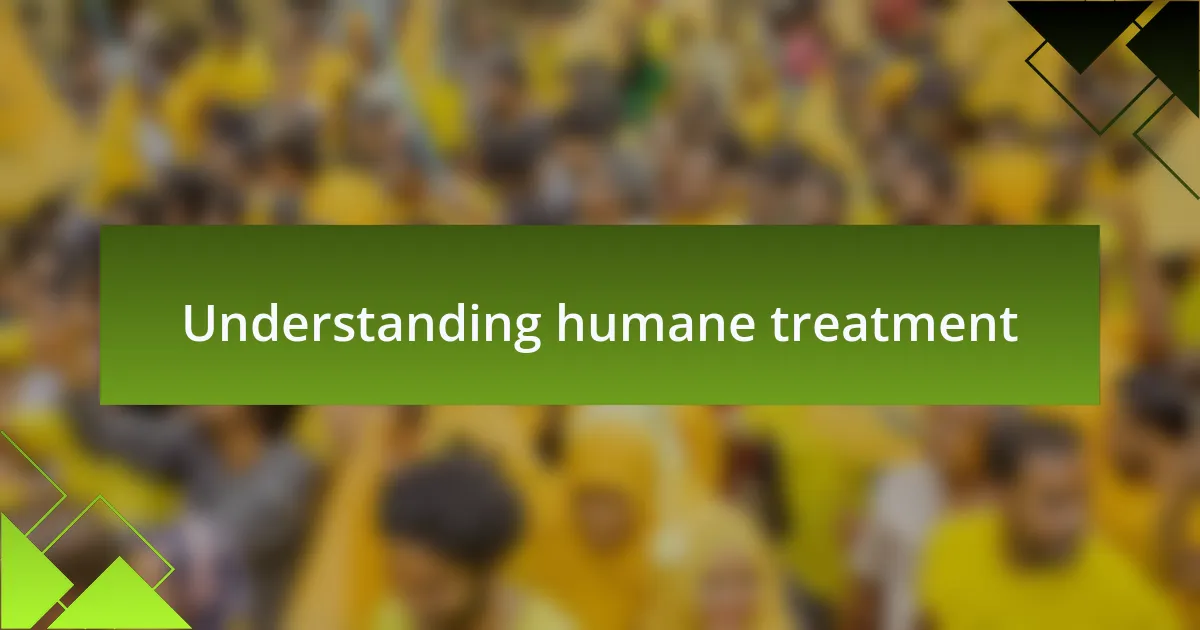
Understanding humane treatment
Humane treatment embodies the principle that every person, regardless of their actions, deserves dignity and respect. I often think about the individuals who find themselves in the criminal justice system; they are more than their crimes. Have you ever considered how a single moment can shape a person’s life, turning them from a child with dreams into an adult facing the harsh realities of the law?
From my experiences, I’ve observed that humane treatment involves not just basic physical needs but also emotional support. For instance, I once participated in a program where we engaged inmates in constructive dialogue about their pasts. It was poignant to see how compassion could spark a desire for change; many participants were hungry for connection and understanding, ultimately allowing self-reflection and growth.
It begs the question: what do we lose as a society when we deny humane treatment? I believe it’s crucial to recognize that fostering rehabilitation rather than punishment can lead to a more just world. In my view, humane treatment has the power to break cycles of violence and despair, promoting healing for everyone involved.
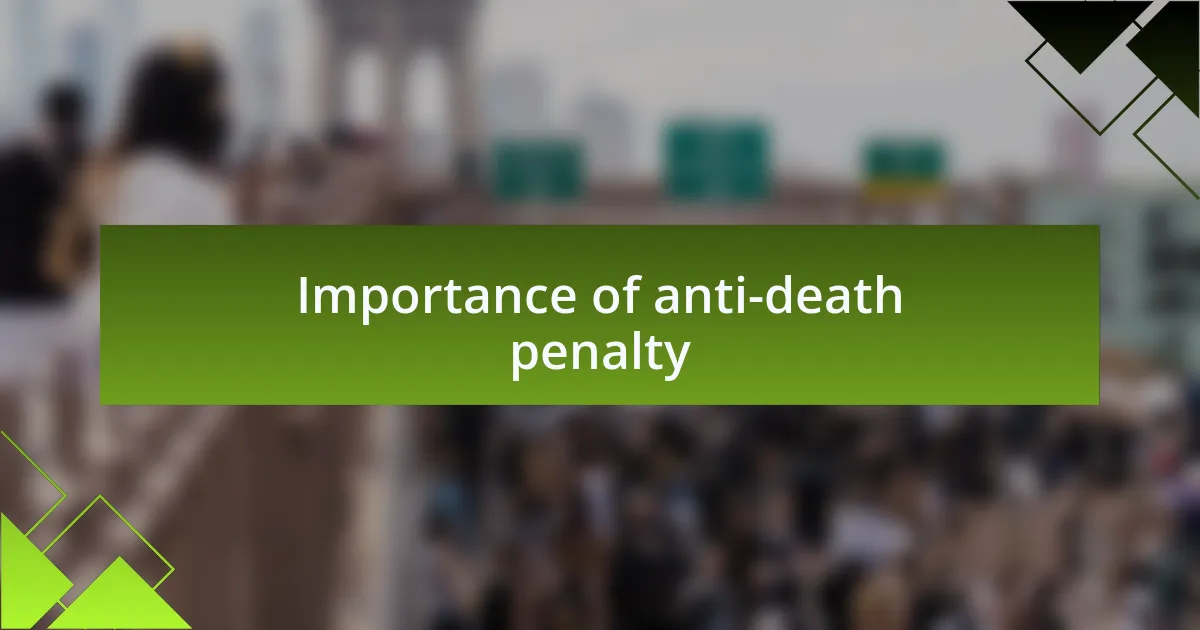
Importance of anti-death penalty
The importance of the anti-death penalty movement cannot be overstated, as it challenges us to confront the moral implications of capital punishment. I remember a conversation I had with a friend who was adamantly for the death penalty. Throughout our discussion, I questioned whether we should allow the state to hold the power of life and death over an individual. This dialogue led us to reconsider the inherent value of a human life, even when mistakes are made.
One striking facet of opposing the death penalty is the emphasis on its flaws within the justice system. For instance, countless individuals have been exonerated after spending years on death row. When I learned about cases where innocent people were convicted, it left me with a heavy heart. How many more lives are at stake due to judicial errors? This reality highlights the need for a legal framework that prioritizes rehabilitation over irreversible actions.
Moreover, advocating against the death penalty brings a much-needed focus on systemic issues in our society, such as racism and socioeconomic disparities. In my experience volunteering with at-risk youth, I have seen firsthand how these factors contribute to crime. If we genuinely wish to foster a just and equitable society, we must pursue alternatives that address these underlying causes rather than opting for a final, irreversible solution. Isn’t it more compassionate to seek transformation rather than retribution?
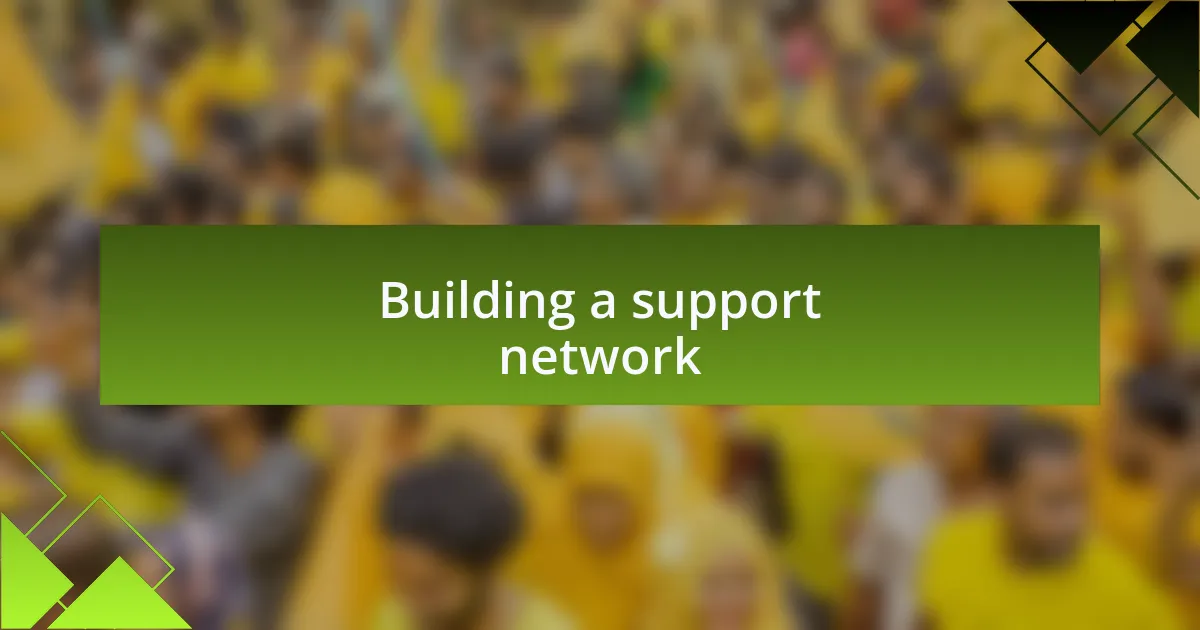
Building a support network
Building a support network is crucial in advocating for humane treatment and dismantling the death penalty. I recall attending a local community meeting where various advocates shared their experiences and strategies. Seeing people from different walks of life come together, united by a common cause, was inspiring. It reminded me that change often starts at the grassroots level, with individuals rallying around shared values.
Connecting with like-minded individuals can expand our understanding and approach to the issue. For instance, I joined a social media group focused on death penalty abolition, where members regularly share resources and personal stories. One poignant narrative involved a former prison guard who transformed his views after witnessing the flawed execution of a mentally ill inmate. How often do we consider the perspectives of those working within the system? Such insights ignite a deeper commitment and fuel our collective efforts.
Moreover, forming alliances with organizations dedicated to helping those on death row can be life-altering. I’ve participated in letter-writing campaigns to inmates, which not only humanizes their experiences but also reinforces our shared responsibility to advocate for their dignity. It feels empowering to engage directly, reminding us that empathy and connection can drive real change. Isn’t it uplifting to think that our collective voices can challenge systemic injustices?
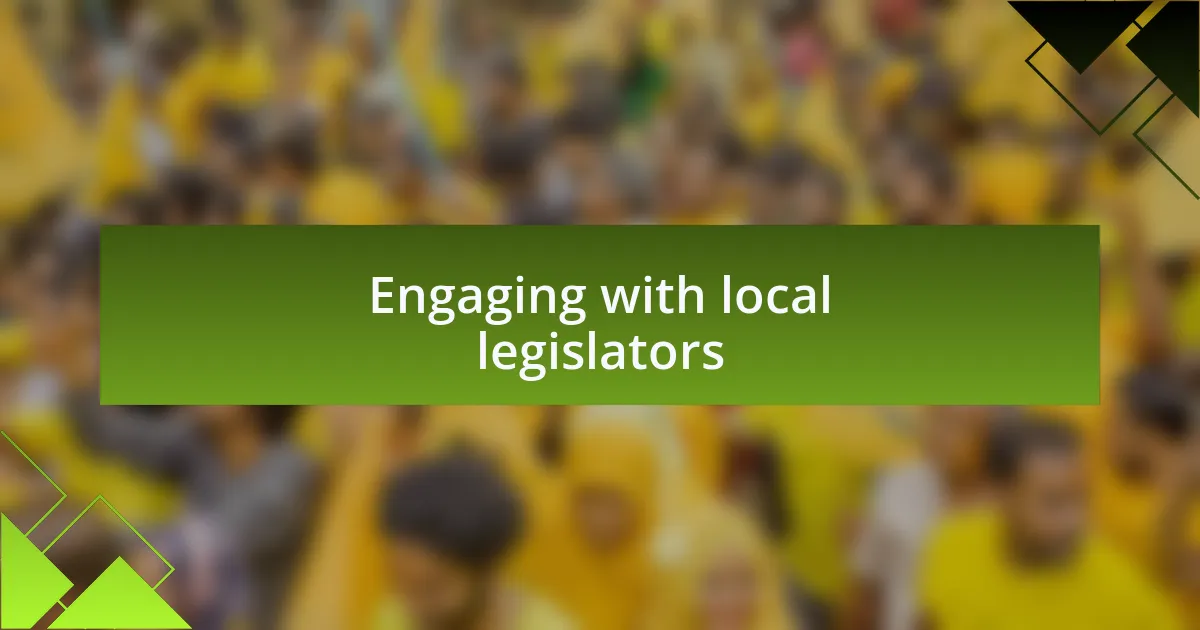
Engaging with local legislators
Engaging with local legislators can be a profoundly impactful way to advocate for humane treatment and the abolition of the death penalty. I remember attending a town hall meeting where a legislator shared their views on criminal justice reform. It struck me how powerful it can be to ask questions directly—like, “What steps are you taking to ensure justice is fair for all?” This simple inquiry opened a dialogue and encouraged others to share their concerns, creating a ripple effect in the room.
Building relationships with lawmakers doesn’t stop at meetings. I’ve found it invaluable to follow up with personalized emails that outline the reasons I’m passionate about this issue. Once, I crafted a message after learning about a local case where a man was wrongfully sentenced to death. Sharing my concerns about the flaws in our justice system made the issue tangible. Seeing a response where the legislator acknowledged my views felt like a small victory, showing that my voice mattered.
Additionally, attending advocacy days at the state capitol has brought the issue to life for me. Walking through hallways filled with passionate advocates, I saw firsthand how our collective energy impacts legislators. During one such event, when I approached a legislator and recounted a personal story of a loved one wrongfully imprisoned, I could see that it resonated. It made me wonder—how often do we connect our personal experiences to broader legislation? I believe that when legislators hear our stories, they’re more likely to consider the humanity behind the policies they create.
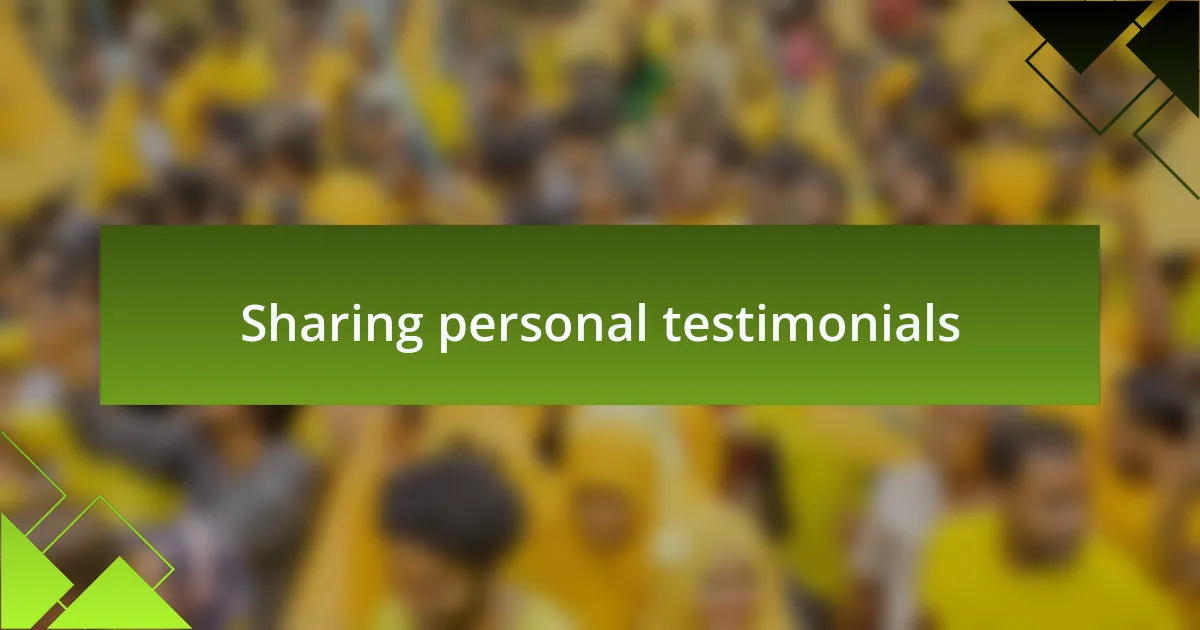
Sharing personal testimonials
Sharing personal testimonials plays a crucial role in advocating for humane treatment. I recall attending a community gathering where a family member of a death row inmate spoke up. Hearing her recount the anguish of waiting for a verdict for years made the abstract concept of capital punishment feel extremely personal. It created an atmosphere of empathy, prompting many of us to consider how easily any of us could end up in such a dire situation.
One experience that stands out is when I shared my own story about a friend who faced severe sentencing for a crime he didn’t commit. As I spoke about the emotional toll it took on me and his family, I noticed heads nodding in agreement. How can we disregard the human stories entwined with policies that decide life and death? I truly believe that when we weave our lived experiences into these conversations, we deepen understanding and inspire action among those who might feel indifferent.
Testimonials can spark conversations that shift perspectives. I once participated in a panel discussion where survivors of wrongful convictions shared their journeys. The courage they displayed as they recounted their trials and triumphs struck a chord with the audience. It made me realize that sharing our narratives isn’t just about making a case—it’s about shining a light on the lived experiences that underscore the need for change. Why is it important that we share these stories? Because they showcase humanity in a system often perceived as cold and detached.
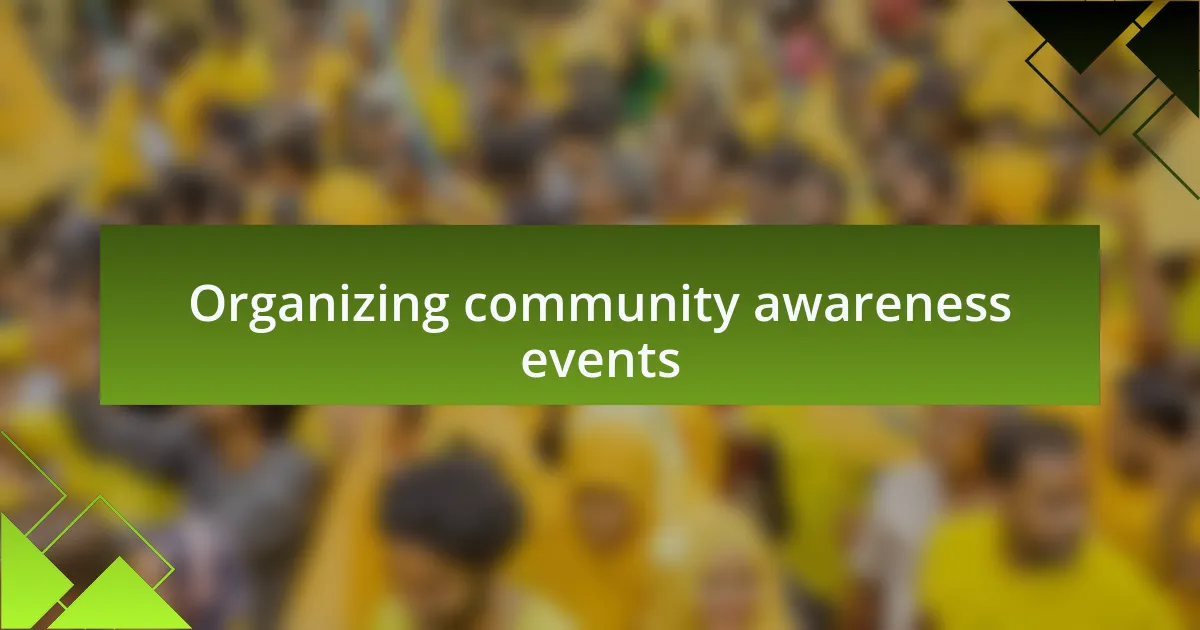
Organizing community awareness events
Organizing community awareness events is a powerful way to foster understanding and compassion around issues related to the death penalty. I recall one local event where we set up a simple booth at a community fair. As we engaged with attendees, I saw the shift in their expressions from indifference to curiosity when we discussed the human stories behind the statistics. It was a reminder of how face-to-face interactions can create connections that promote awareness.
One unforgettable moment happened during a candlelight vigil we organized. I watched as people gathered in silence, their faces illuminated by the soft glow of the candles. In that peaceful setting, we shared stories of individuals impacted by the death penalty, and the shared silence spoke volumes. How many people realized, in that moment, the weight of each life affected? It’s incredible how these gatherings can awaken empathy and spark dialogue, making the unthinkable feel real and present.
At another awareness event, I facilitated a discussion where participants were encouraged to voice their feelings about capital punishment. I shared a personal account of a former inmate’s release and his struggles to reintegrate into society. That conversation unearthed raw emotions; some attendees expressed anger, while others shared hope. How often do we get the chance to voice our thoughts on such a divisive issue? It was clear to me then that these events not only inform but also allow the community to process their feelings, paving the way for meaningful change.